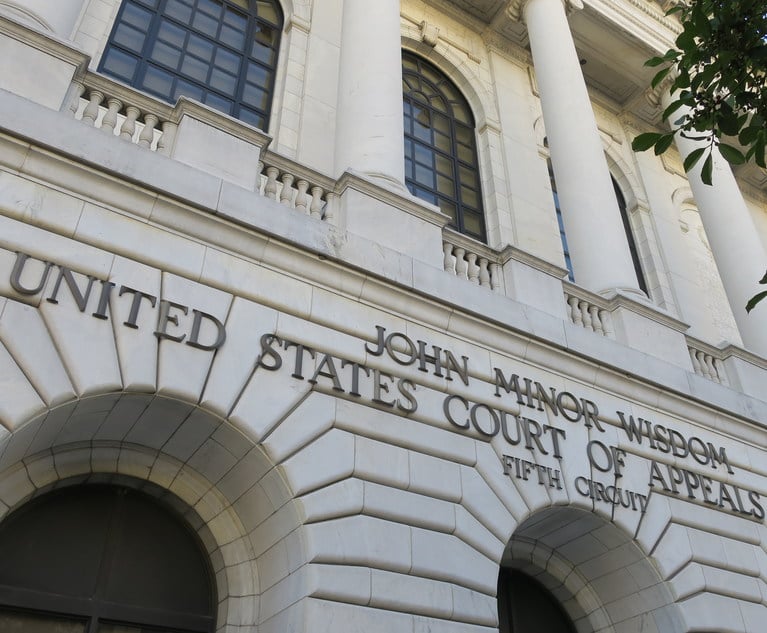Court Says No Relief From Affidavit of Merit Without Effort at Compliance
A lawyer's failure to file an affidavit of merit in a nursing malpractice suit is not an extraordinary circumstance warranting relief from filing deadlines, a New Jersey appeals court has ruled.
March 01, 2018 at 05:19 PM
4 minute read

A lawyer's failure to file an affidavit of merit in a nursing malpractice suit is not an extraordinary circumstance warranting relief from filing deadlines, a New Jersey appeals court has ruled.
The appeals court affirmed the dismissal of claims against three jailhouse nurses in the death of a prisoner. In a published ruling, the court said in Yearby v. Middlesex County that a judge below erroneously reinstated claims against the nurses in connection with the death of a mentally ill prisoner, David Yearby, in November 2014.
Yearby, 27, arrested on charges of assaulting a Piscataway police officer, died while strapped into a restraint chair at the Middlesex County Adult Corrections Center. Guards placed a hood over his head to prevent him from spitting, but the suit says that was dangerous because he suffered from asthma. He apparently suffered a broken neck when guards forcibly removed him from his cell.
Attorney Gregg Zeff of the Zeff Law Firm in Mount Laurel, New Jersey, filed suit on behalf of Yearby's estate, naming the nurses, several police officers and prison guards, and Piscataway Township and Middlesex County as defendants. A motion by the nurses—Angela Ward, Gideon Thuo and Nicole Tuesday—for dismissal based on the failure to file an affidavit of merit in their case was granted by Superior Court Judge Vincent Leblon. Then substitute counsel for the plaintiffs, Newark attorney Brooke Barnett, moved to reinstate the charges.
She claimed that Zeff's failure to take any action to comply with the affidavit of merit statute, including his failure to oppose the nurses' motion to dismiss, constituted “extraordinary circumstances” warranting a break from the sanction of dismissal. Leblon granted her motion, but on appeal, Judges Jose Fuentes, Ellen Koblitz and Thomas Manahan reversed in a published decision.
Fuentes, writing for the court, said Zeff “failed to take any measures to comply with the clear, time-sensitive requirements of the Affidavit of Merit statute. In fact, from his earliest interactions with the judicial system, counsel behaved as if the civil complaint he prepared and filed did not raise any claims based on the tort of professional malpractice. The doctrine of substantial compliance is not applicable when the record shows a complete failure to take any measures to comply.”
What's more, “the equitable concept of 'extraordinary circumstances' has never been used to relieve an attorney from the legal and ethical consequences of failing to competently perform his or her professional responsibilities,” Fuentes wrote for the court.
“We are keenly aware of the seriousness of the allegations raised in this civil action. The circumstances that plaintiffs allege caused this young man's death are unimaginably horrific. Those who are found civilly liable should be held accountable. However, as established by the legislature and recognized by the Supreme Court, an affidavit of merit strikes at the heart of the cause of action. Thus, neglecting to provide an affidavit of merit after the expiration of the 120-day time period generally requires dismissal with prejudice,” Fuentes wrote.
Plaintiff lawyer Barnett said she respectfully disagreed with the ruling. “Because of Mr. Zeff failing to see this case having a medical malpractice cause of action, it's unfortunate that my client has to suffer for that. In the end, there's culpability there,” she said.
Barnett said the case would proceed against the remaining defendants.
Zeff did not return a call seeking comment. Stephen Holtzman and Jeffrey McClain of Holtzman McClain in Linwood, New Jersey, who represented the nurses, also did not return calls.
This content has been archived. It is available through our partners, LexisNexis® and Bloomberg Law.
To view this content, please continue to their sites.
Not a Lexis Subscriber?
Subscribe Now
Not a Bloomberg Law Subscriber?
Subscribe Now
NOT FOR REPRINT
© 2025 ALM Global, LLC, All Rights Reserved. Request academic re-use from www.copyright.com. All other uses, submit a request to [email protected]. For more information visit Asset & Logo Licensing.
You Might Like
View All
Legal Issues to Watch in the US Appeals Courts in 2025


'Point Us to the Plain Language': NJ Supreme Court Grills Defense Statutory Requirements for Affidavit of Merit
5 minute read
3rd Circuit Judges Zero In on Constitutional Challenges to Medicare Drug Pricing Program
Trending Stories
- 1Trump's DOJ Files Lawsuit Seeking to Block $14B Tech Merger
- 2'No Retributive Actions,' Kash Patel Pledges if Confirmed to FBI
- 3Justice Department Sues to Block $14 Billion Juniper Buyout by Hewlett Packard Enterprise
- 4A Texas Lawyer Just Rose to the Trump Administration
- 5Hogan Lovells Hires White & Case Corporate and Finance Team in Italy
Who Got The Work
J. Brugh Lower of Gibbons has entered an appearance for industrial equipment supplier Devco Corporation in a pending trademark infringement lawsuit. The suit, accusing the defendant of selling knock-off Graco products, was filed Dec. 18 in New Jersey District Court by Rivkin Radler on behalf of Graco Inc. and Graco Minnesota. The case, assigned to U.S. District Judge Zahid N. Quraishi, is 3:24-cv-11294, Graco Inc. et al v. Devco Corporation.
Who Got The Work
Rebecca Maller-Stein and Kent A. Yalowitz of Arnold & Porter Kaye Scholer have entered their appearances for Hanaco Venture Capital and its executives, Lior Prosor and David Frankel, in a pending securities lawsuit. The action, filed on Dec. 24 in New York Southern District Court by Zell, Aron & Co. on behalf of Goldeneye Advisors, accuses the defendants of negligently and fraudulently managing the plaintiff's $1 million investment. The case, assigned to U.S. District Judge Vernon S. Broderick, is 1:24-cv-09918, Goldeneye Advisors, LLC v. Hanaco Venture Capital, Ltd. et al.
Who Got The Work
Attorneys from A&O Shearman has stepped in as defense counsel for Toronto-Dominion Bank and other defendants in a pending securities class action. The suit, filed Dec. 11 in New York Southern District Court by Bleichmar Fonti & Auld, accuses the defendants of concealing the bank's 'pervasive' deficiencies in regards to its compliance with the Bank Secrecy Act and the quality of its anti-money laundering controls. The case, assigned to U.S. District Judge Arun Subramanian, is 1:24-cv-09445, Gonzalez v. The Toronto-Dominion Bank et al.
Who Got The Work
Crown Castle International, a Pennsylvania company providing shared communications infrastructure, has turned to Luke D. Wolf of Gordon Rees Scully Mansukhani to fend off a pending breach-of-contract lawsuit. The court action, filed Nov. 25 in Michigan Eastern District Court by Hooper Hathaway PC on behalf of The Town Residences LLC, accuses Crown Castle of failing to transfer approximately $30,000 in utility payments from T-Mobile in breach of a roof-top lease and assignment agreement. The case, assigned to U.S. District Judge Susan K. Declercq, is 2:24-cv-13131, The Town Residences LLC v. T-Mobile US, Inc. et al.
Who Got The Work
Wilfred P. Coronato and Daniel M. Schwartz of McCarter & English have stepped in as defense counsel to Electrolux Home Products Inc. in a pending product liability lawsuit. The court action, filed Nov. 26 in New York Eastern District Court by Poulos Lopiccolo PC and Nagel Rice LLP on behalf of David Stern, alleges that the defendant's refrigerators’ drawers and shelving repeatedly break and fall apart within months after purchase. The case, assigned to U.S. District Judge Joan M. Azrack, is 2:24-cv-08204, Stern v. Electrolux Home Products, Inc.
Featured Firms
Law Offices of Gary Martin Hays & Associates, P.C.
(470) 294-1674
Law Offices of Mark E. Salomone
(857) 444-6468
Smith & Hassler
(713) 739-1250






